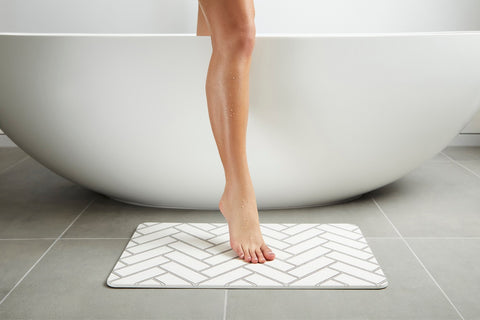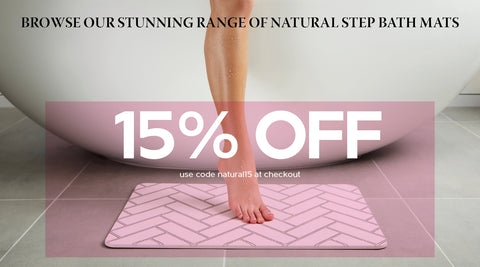
The most super absorbent types of bath mat
Which types of bath or shower mat are super absorbent?
Are you looking for a bath mat material that will soak up all the water your kids, partner or flat mate drips everywhere after using the shower or bath?
This article discusses how absorbent the main types of material used to make bath and shower mats are. It also highlights that being too absorbent can actually a negative in many respects.

What types of bath mats are there?
We have done a full review of all the different types of bath mat material available on the market in another blog article. This article will concentrate on the most popular types:
- Microfibre – absorbs up to 7 x its own weight, fast rates of water uptake
- Cotton – absorbs up to 27 x its own weight, fast rates of water uptake
- Natural earth stone – absorbs x 2 its own weight with fast rate of water uptake
- Rubber – hydrophobic meaning it absorbs no water
- Wood - can hold up to 0.8 x its own weight in water with slow rate of water uptake
Fabric bath mats like cotton or microfibre are highly absorbent. Cotton is said to be able to absorb 24 to 27 times its own weight in water!
To give you an idea, a cotton bath mat may weigh between 0.6kg and 1kg when dry and when fully saturated could weight 27kg!
Synthetic microfibres are also light, and is said to hold up to 7 times its own weight in water. This isn’t quite as staggering as cotton but would mean a mat weighting 1kg when dry could weigh as much as 7kg when saturated.
A Natural earth stone shower mat typically weights around 2kg and 6kg when fully saturated.
A rubber bath mat weight would not change as all the water is repelled.
A typical 2kg wooden bath mat could weight 3.6kg, although this would take a long period of submersion.
Why super absorbent bath mats are not necessarily a good thing?
Like all things in life, the best option is normally about finding a balance. You may want your bath mat to absorb water quickly but this also creates problems.
Problems with a fabric bath mat being too absorbent
- Become too heavy for domestic washing machines when set
- Retain water without drying out for too long
- Cause bacteria and mould growth
Saturated bath mats reduce the life of your washing machine
When fabric bath mats go in a washing machine, they absorb lots of water and become very heavy. The weight is far more than a domestic washing machine is designed for and the result is a reduction of your washing machines lifespan or expensive repairs. We advised in a previous article not to wash and dry fabric bath mat mats for this reason.
Excessively wet bath mats lead to bacteria and mould growth
Heavily saturated bath mats also need to be immediately lifted up and dried on a radiator or taken outside as they will not dry quickly laid on the floor. Anything that takes a long period to dry will lead to bacteria and mould growth and may also damage the floor underneath, depending what its made of. Drying wet mats and clothes indoors in itself is not particularly good for creating a healthy environment.
The problem with rubber and wood bath mats is that they repel the water so they are not so great for getting feet dry or preventing lots of water going all over the bathroom.
Wooden bath mats are also prone to mould if they are not dried out, the water seeps slowly into the wood causing it to expand and crack over time. Drying wooden mats thoroughly can take time, you will know this from firewood you gather that may appear dry on the outside but can lock water in its structure.
What is the best solution?
There is another option, Natural step bath mats are made from a composition of highly absorbent stone. A typical mat weights 2kg and can absorb up to twice its own weight in water which is 4 litres. What is more interesting is that this water dries very rapidly indeed, within 10 mins between 18 and 22 degrees C, the mat will have dried completely if lifted up. All the time the outer of the mat remaining dry to the touch.
A Natural Step bath or shower mat does not need to be machine washed or dried, simply wiped clean periodically. This will save your washing machine from premature retirement and between £25 and £40 a year on electricity! Whats not to like.


Comments (0)
There are no comments for this article. Be the first one to leave a message!